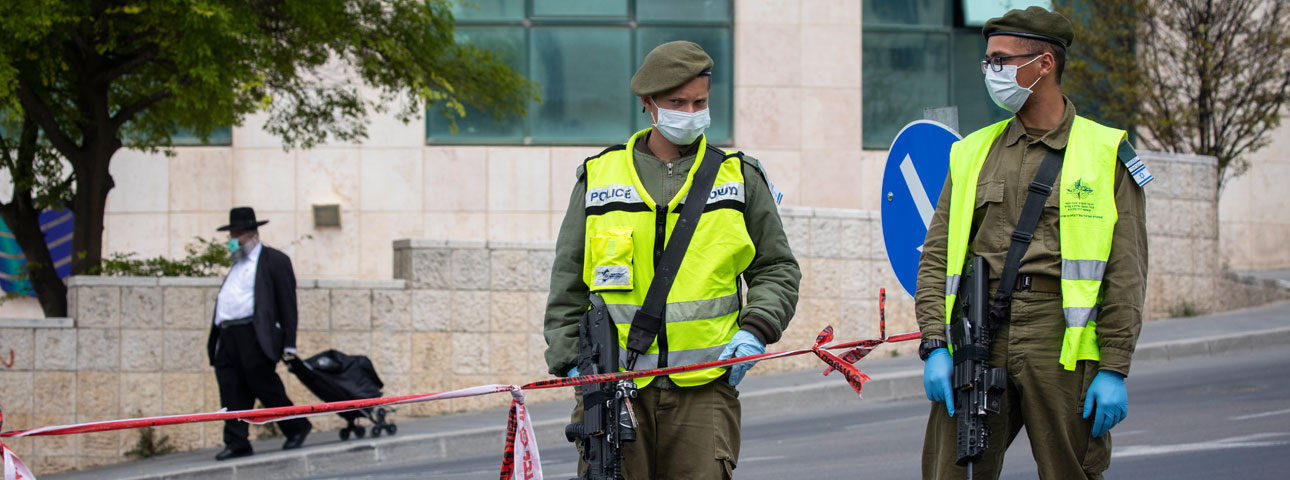Large Majority Think IDF Should Manage Coronavirus Crisis
A special survey conducted by the Center for National Security and Democracy and Guttman Center for Public Opinion and Policy Research at the Israel Democracy Institute, in partnership with the Konrad Adenauer Stiftung (Israel office), shows that although the IDF is perceived as a skilled army that will meet its security missions, when it comes to issues related to the public's values and other social issues, the public proclaims less confidence in the military's capabilities.

Flash 90
The survey was conducted among Jewish Israelis ahead of the annual conference of the Center for National Security and Democracy to be held on November 24-25th.
Survey Highlights
The army is ready and waiting – the home front is left far behind
73% of Israelis think that the IDF is prepared to deal with the major military threats that Israel faces. However it seems that the public has internalized the message that the Home Front Command (HFC) will not be able to provide absolute protection for civilians in face of a military attack. Only 39% think that civilians in Israel will be protected in case of widespread military attack.
Let the IDF triumph – also over the coronavirus
The majority of Israelis think that the IDF should not be limited to military operations against enemies – but should also be responsible for other activities, such as involvement in managing the corona crisis or teaching supplemental Hebrew. 65% of respondents want the IDF to be given responsibility for managing the corona crisis. This opinion spans across the political camps – 78% among the left, 71% among the center and 61% among the right agree. A correlation was also evident between these responses and the ages of those surveyed with older individuals more likely to support IDF involvement in this civilian mission.
The IDF should be put in charge of managing the corona crisis (%, entire sample, agree very much or agree pretty much)
In relation to the corona crisis 58% of Israelis think the IDF should be put in charge of general lockdowns.
IDF Senior Commanders
60% of Israelis think that IDF senior commanders’ professional recommendations are influenced by considerations that are not necessarily of military nature. Other possible considerations noted could be political, economic or humanitarian factors.
Nevertheless, 72.5% of Israelis trust IDF senior commanders’ professionalism – with some variations between the political camps – 81.5% among the left, 73% among the center and 72% among the right. 65% trust the professionalism of lower level commanders.
55% think that IDF senior commanders’ value system is similar to the general public’s, however 26% think that there is a wide rift between the two value systems.
Trust and Reliability
64% of Israelis think that the IDF Spokesperson's Unit is a reliable source of information.
Nevertheless, regarding two central issues, the public casts doubt on the IDF Spokesperson's reliability. Only 32% think that the IDF’s reports on the number of ultra-Orthodox recruited are reliable – this opinion is consistent across political affiliations. Only 29% of the ultra-Orthodox and 27% of the secular think that the IDF’s reports on this issue are reliable.
In addition, there are low levels of trust in the IDF’s reports on suicide rates among soldiers – only 38% of the public trust these reports. Segmentation among political camps reveals agreement among 40% of the right and 26% among the left.
Trust the IDF’s Reports (%, entire sample, by political camp)
IDF and Economic Efficiency
Only 34.5% of Jewish Israelis think that the IDF operates in an economically efficient manner, while 51% think that that it is economically inefficient. Among those who identify with the political left and center, more than 60% of respondents think IDF’s economic management is inefficient while only 47% of supporters of the right feel this way.
The IDF is economically efficient (%, entire sample, by political camp)
48% of Israelis think that the retention of manpower in the professionally military service (as opposed to those serving their compulsory service) in the IDF does not justify that the earlier retirement age than exists in other sectors of the public sector. 56% think that higher salaries in the IDF, compared to those in other public sector jobs, are justified as a means to retain high quality personnel. The survey did not find substantial disparities on this question by political camp, religious affiliation or age.
The People’s Army?
Twenty-five years after the Supreme Court ruling on the Alice Miller case (allowing women to apply to the IDF's Flight Academy) and against the backdrop of current petitions to allow women to serve in elite combat units – only 43% of respondents think that the IDF affords women equal opportunity to fulfill their personal potential – 50% among men and 36% among women.
46% of Jewish Israelis think that the IDF affords religious and secular soldiers equal opportunities to fulfill their personal potential. As the level of religiosity goes up, trust in the IDF’s ability to be unaffected by Israeli tribalism goes down – only 22% among ultra-Orthodox, 38% of national religious and 48% of secular think that the IDF affords equal opportunities.
The survey was prepared by the Guttman Center for Public Opinion and Policy Research of the Israel Democracy Institute. In the survey, which was conducted on the internet and by telephone (supplements of groups that are not sufficiently represented on the network) during September 13-16, 2020, 1,012 men and women were interviewed in Hebrew constituting a representative national sample of the Jewish adult population of Israel aged 18 and older. The maximum sampling error for the entire sample was 3.16%± at a confidence level of 95%. The fieldwork was done by the Panel Politics headed by Menachem Lazar. For the full data file see: Data Israel
